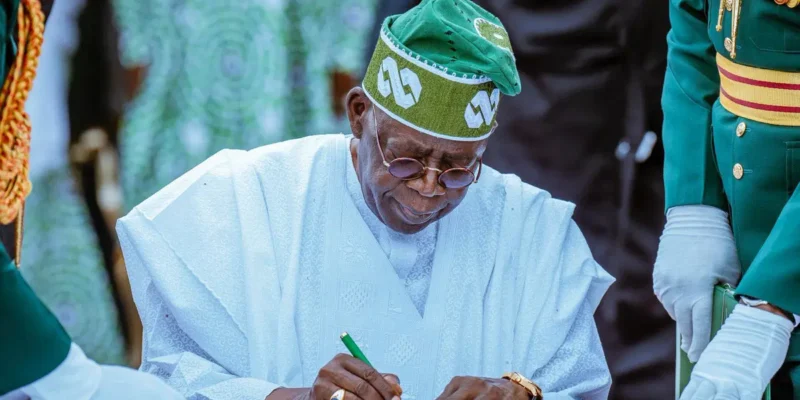President Bola Ahmed Tinubu has approved a sweeping reorganization of Nigeria’s military leadership, signaling a renewed push to strengthen the nation’s security architecture and enhance operational efficiency across the Armed Forces.
In a statement issued by his Special Adviser on Media and Public Communication, Sunday Dare, the President announced the appointment of General Olufemi Oluyede as the new Chief of Defence Staff, replacing General Christopher Musa. Major General Waidi Shuaibu assumes office as Chief of Army Staff, Air Vice Marshal S.K. Aneke becomes the Chief of Air Staff, while Rear Admiral Idi Abbas takes over as the Chief of Naval Staff. Major General E.A.P. Undiendeye retains his position as Chief of Defence Intelligence.
According to the statement, all appointments take immediate effect. President Tinubu commended the outgoing Service Chiefs for their patriotic service and urged the new military leaders to justify the confidence reposed in them by advancing professionalism, vigilance, and cooperation across the armed forces.
“The President, Commander-in-Chief of the Armed Forces, expresses profound appreciation to the outgoing Service Chiefs for their dedicated leadership,” the statement read. “He charges the newly appointed officers to enhance the professionalism, vigilance, and comradeship that define the Nigerian Armed Forces.”
The changes come after months of speculation about an impending shake-up within the military, aimed at injecting fresh energy and strategy into Nigeria’s ongoing security operations against insurgency, banditry, and organized crime.
Mixed Reactions from Retired Military Generals
Reactions from retired senior military officers have been largely positive, describing the move as timely and necessary to restore career progression and operational dynamism within the services.
A retired General who spoke with Saturday Vanguard noted that the rotation of service chiefs aligns with long-established military tradition.
“This is routine and long overdue,” he said. “Normally, Service Chiefs serve for about two years before rotation. In the past, keeping them beyond that period created stagnation and forced retirements of younger, capable officers. This change restores order and fairness.”
Similarly, retired General Anthony Atolagbe described the shake-up as a morale booster for the military, saying it will “rekindle excitement and career growth” across the ranks.
“It was the practice for Service Chiefs to serve for two years until recent administrations disrupted that pattern,” Atolagbe said. “This return to normalcy will enhance career progression and inject new energy into the system.”
Other retired officers emphasized the importance of granting the new Service Chiefs operational freedom and political backing to deliver tangible results.
Rear Admiral Dickson Olisemelogor (rtd) commended the appointments as “timely and necessary,” but stressed that success will depend on allowing the military full independence to execute its duties.
“The President has chosen capable and experienced officers,” he said. “But the political class must give them a free hand, clear directives, and unwavering support if we want results.”
Security analyst and Executive Director of the Rule of Law and Accountability Centre (RULAAC), Okechukwu Nwanguma, also welcomed the appointments but cautioned that performance must go beyond symbolism.
“Leadership changes can reinvigorate the security sector,” Nwanguma said. “However, the real measure will be whether the new Service Chiefs bring fresh strategy, integrity, and accountability to the fight against insecurity.”
Profiles of the Newly Appointed Service Chiefs
General Olufemi Oluyede – Chief of Defence Staff
General Olufemi Oluyede replaces General Christopher Musa as the Chief of Defence Staff. A career officer with decades of experience, he is widely regarded as a strategist with deep understanding of inter-service coordination and national defense management.
Major General Waidi Shuaibu – Chief of Army Staff
Born in Olomaboro Local Government Area of Kogi State, Major General Waidi Shuaibu is a member of the 41 Regular Course of the Nigerian Defence Academy. Commissioned in 1994 into the Nigerian Army Armoured Corps, he holds multiple postgraduate degrees, including in Public Administration and Strategic Studies, from institutions such as the University of Calabar, University of Ibadan, and the National Defence University in Washington.
He has held numerous command and instructional positions, including Brigade Commander of the 21 Special Armoured Brigade, Director at the National Defence College, and General Officer Commanding 7 Division, Maiduguri. Until his appointment, he served at the Nigerian Army Heritage and Future Centre, Abuja.
Rear Admiral Idi Abbas – Chief of Naval Staff
Rear Admiral Idi Abbas, born in Kano State on September 20, 1969, is an Above Water Warfare specialist with extensive operational and academic credentials. A graduate of the Nigerian Defence Academy’s 40 Regular Course, he holds a degree in Chemistry and has attended numerous local and international military courses.
He previously served as Chief of Naval Safety and Standards and Chief of Defence Civil-Military Relations before his elevation to Chief of Naval Staff. Known for his disciplined leadership and strategic insight, Abbas is respected for his focus on operational efficiency and maritime safety.
Air Vice Marshal S.K. Aneke – Chief of Air Staff
Air Vice Marshal Aneke brings over three decades of service in Nigeria’s Air Force, with special expertise in air defense and tactical operations. He has played critical roles in internal security operations and international peacekeeping missions.
Major General E.A.P. Undiendeye – Chief of Defence Intelligence
Major General Undiendeye retains his position as Chief of Defence Intelligence. He is recognized for his deep intelligence background and commitment to inter-agency coordination in addressing emerging threats.
Renewed Hope for National Security
The sweeping changes reflect President Tinubu’s broader effort to rejuvenate Nigeria’s defense institutions, emphasizing professionalism, accountability, and inter-agency synergy.
Security analysts view the appointments as a step toward restoring confidence in the armed forces and positioning them to deliver on the administration’s promise of peace and stability.
The coming months will test the new Service Chiefs’ ability to translate strategy into measurable security gains across Nigeria’s diverse and challenging terrain.

Comments